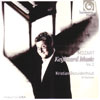Mozart Keyboard Works Vol 2
Mozart’s blackest minor-key moods explored on a period keyboard
View record and artist detailsRecord and Artist Details
Composer or Director: Wolfgang Amadeus Mozart
Label: Harmonia Mundi USA
Magazine Review Date: 2/2011
Media Format: CD or Download
Media Runtime: 71
Mastering:
Stereo
Catalogue Number: HMU907498

Tracks:
| Composition | Artist Credit |
|---|---|
| Sonata for Piano No. 10 |
Wolfgang Amadeus Mozart, Composer
Kristian Bezuidenhout, Fortepiano Wolfgang Amadeus Mozart, Composer |
| Rondo |
Wolfgang Amadeus Mozart, Composer
Kristian Bezuidenhout, Fortepiano Wolfgang Amadeus Mozart, Composer |
| Adagio |
Wolfgang Amadeus Mozart, Composer
Kristian Bezuidenhout, Fortepiano Wolfgang Amadeus Mozart, Composer |
| Sonata for Piano No. 14 |
Wolfgang Amadeus Mozart, Composer
Kristian Bezuidenhout, Fortepiano Wolfgang Amadeus Mozart, Composer |
Author: Nalen Anthoni
Mozart’s medical history convinced Dr Peter J Davies that he had “a chronic mood disturbance which was associated with pathological mood-swings of hypomania and depression”. That is, Mozart was bipolar. For HC Robbins Landon, he produced his “most troubled, alarming and even dangerous music” during black moods, “baleful pieces” in minor keys, three of which are on this disc.
Troubled they certainly are; and Kristian Bezuidenhout does try to fathom the inner recesses of a disquieted mind. The fast transients of his fortepiano (a Paul McNulty copy of an Anton Walter, c1802) lay bare a “moodscape” of A minor bleakness in the opening statement of the Rondo, K511. The moments of light from major keys (the A major section also warmed up by the lever-controlled moderator) are just that. Starkness predominates, as it also does in the Adagio, K540. But here Bezuidenhout, perhaps surmising impending tragedy too, introduces a hushed poignancy to the last page of the piece.
Introversion runs deep. Not so in the Sonata, K457. Unrest flares up as Bezuidenhout unleashes a varied set of emotions even in the Adagio, where agitated undercurrents keep bubbling up to disturb an apparently serene surface. His performances of these three works are of great import. Ditto his interpretation of the slow movement of K330. He seems least interested in the least inspired work, the Rondo, K485. No matter. This is Mozart rethought, unsanitised and maybe unsettling for some. But as Bezuidenhout implies, we have to move on.
Discover the world's largest classical music catalogue with Presto Music.

Gramophone Digital Club
- Digital Edition
- Digital Archive
- Reviews Database
- Full website access
From £8.75 / month
Subscribe
Gramophone Full Club
- Print Edition
- Digital Edition
- Digital Archive
- Reviews Database
- Full website access
From £11.00 / month
Subscribe
If you are a library, university or other organisation that would be interested in an institutional subscription to Gramophone please click here for further information.





